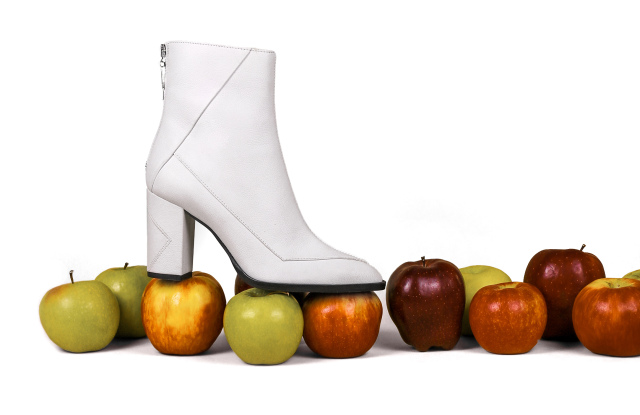Fashion Embraces Apple Leather, Traceable Cotton, Reusable Packaging – WWD
From brands taking up traceable cotton and reusable packaging to New York-based footwear designers getting a taste for apple leather — the fashion industry is expanding its uptake of sustainable materials.
Brands Taking Up E3 Sustainable Cotton: Chemical management company BASF wants its E3 cotton — which it claims to be the “only cotton produced in the USA that is fully traceable” — to be known more broadly to fashion players.
So far, it’s moving in the right direction.
In the coming months, designer Todd Snyder plans to tap into E3 cotton, which stands for “equitable, economical and environmental,” and Rag & Bone will unveil a capsule collection for fall 2021. To date, Raleigh Denim, Wrangler Rooted, Imogene + Willie, Left Field and Trinidad3 offer jeans made from 100 percent E3 sustainable cotton.
The E3 sustainable cotton program keeps detailed records and sustainability calculations that occur after cotton seeds are planted using a tracing software called “MyFarms.”
“This tracing is what makes our business model so unique. Before the seed is even planted, we trace the seed breeding itself through its complete commercial production process. There is no comparable program in the USA; it is the first of its kind,” said Jennifer Crumpler, the E3 sustainable cotton program manager. “The E3 sustainable cotton is also the only program that gives back to the farmer by paying them $2.50 per bale premium on every bale of E3 sustainable cotton enrolled.”
Farmers capture every pass across the field including the planting, spraying, fertilizer, tillage and irrigation operations. According to the company, this information is then converted using tools managed by independent scientists into seven different areas to measure sustainability including greenhouse gas emissions and irrigation water use.
Once the E3 cotton is harvested into bales, each bale receives a permanent bale identification number.
The program is not shy about its efficiency in growing, so while the use of GMOs, pesticides and synthetic fertilizers is condoned, the E3 guidelines aim to manage these processes. As the company noted, the seeds themselves are GMO but can be grown via organic or conventional farming methods.
Imogene + Willie released its first run of E3 sustainable cotton premium selvage denim sewn by Vidalia Mills in May 2020.
Courtesy
Reusable Packaging Could Aid Carbon Neutral Missions: RePack is tackling the packaging problem that threatens to push ambitious brands’ over in their carbon neutral commitment if they don’t get it right.
The company now works with more than 120 brands in 14 European countries and has seen demand swell over the last year.
“Our packaging talks to a wide audience; from end-users fed up with trash, to sustainability-driven brands, all the way the industry leaders like Zalando, H&M, Otto & Tchibo,” said Samuli Heino, RePack’s chief operating officer.
A week after RePack was available on its web site, Hamburg-based sustainable children’s clothing brand Manitober reported a selection rate of 40 percent, meaning customers opted for the packaging over traditional methods.
“It’s difficult to make a comparison between single-use packaging and a reusable packaging service such as RePack. On…top of the bag itself and the free global return, RePacks offer a lot of additional value; elevated customer experience, reusability, trash elimination, carbon reduction, coolness factor, all of which can potentially provide increased value for a brand,” Heino said.
As for brands concerned with the cost trade-off in exploring reusable packaging, Heino added: “If we want to compare apples to apples, RePack can be free for the brands. We have a pass-through model in which the end consumer pays a small fee for the reusable packaging and is rewarded with a discount once the bag is returned. In this option, RePack is free for the brands.”
RePack reusable packaging.
Courtesy
Apple Leather Has Consumers Biting: New York-based footwear designer Casey Dworkin — behind the brand Sylven New York — has seen a rising interest in its signature apple leather.
The apple leather Sylven works with is currently made from 50 percent organic apple waste, and each season the brand’s supplier further increases that percentage. Some of its vegan leathers employ 100 percent recycled fibers.
“Our Almasi [$495] and Jayne [$425] boots have become our signature styles. Both are offered in vegetable-tanned leather as well as our signature apple leather…We create both leather and vegan versions of our entire collection, working with the most sustainable materials in both categories. But, we really view the full collection as core,” Dworkin said. Our entire seasonless production process has been developed around that philosophy. We work in small batches always aiming to reduce waste, and we plan to replenish our styles indefinitely based on demand.”
Sylven New York’s heels, soles and shoe lasts are created in a closed-loop recycling system. Any waste generated from the footwear production process, instead of being discarded, is used to make the next batch of heels soles or lasts, Dworkin said. And that’s not all the brand is recycling.
“We have a permanent portal on our web site called The ReBoot. It is dedicated to the responsible reuse of photoshoot and production samples, promoting waste reduction and keeping our styles out of landfills. Eighty-four percent of discarded clothing in the U.S. goes to an incinerator or landfill, and we’re working to actively combat this,” she added, citing a figure from the Environmental Protection Agency.
Describing the brand’s customer as “intentional, bold, caring,” Dworkin, herself, has a fated connection to sustainability.
“I grew up a footwear-obsessed creative kid who happened to be born on Earth Day, so sustainability and shoes are in my blood. I dreamed of one day running my own brand that would give equal emphasis to my values and aesthetic. After working in the footwear industry, I suffered an apartment fire that left me with only my health and the clothes (and shoes) on my back. That was the catalyst that motivated me to go out on my own,” she said. “To this day, the capsule wardrobe that I built back up from scratch continues to inspire my designs. Each style is carefully considered, extremely intentional, and personally meaningful.”
Apples, it seems, are just the beginning. Dworkin said coconut husks may be the next materials Sylven New York uses for its shoes.
Sylven New York employs apple leather among its growing list of sustainable material alternatives.
Courtesy


